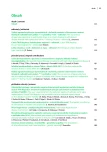-
Medical journals
- Career
How are changing the therapy options in obese diabetic type 2 patients
Authors: Štěpán Svačina
Authors‘ workplace: III. interní klinika 1. LF UK a VFN, Praha, přednosta prof. MUDr. Štěpán Svačina, DrSc., MBA
Published in: Vnitř Lék 2014; 60(10): 902-907
Category: Reviews
Overview
Classical consequence of treatment with anti-diabetic agents, including insulin, is weight gain which enhances insulin resistance and leads to a further increase in drug dose. This creates an unwanted cycle. Administration of weight neutral anti-diabetic drugs has broken this scenario. Another option is to use anti-obesity agents, but actually many of them are not available. However, in the United States, two new drugs have been used in past two years. The most important change in the treatment of obese type 2 diabetes patients is administration of anti-diabetic agents that reduce weight. These agents are well-known incretin analogs characterized by their unpleasant injecting administration. However, application becomes easier and the drugs are administered for the866 longer time period. Even greater change in treatment is administration of gliflozins. Dapagliflozin and empagliflozin enter almost simultaneously to the Czech Republic. The new class of drugs has very complex metabolic effect and in particular significantly reduces the weight even in patients treated with insulin. The treatment options have significantly expanded for obese type 2 diabetes patient in course of this year.
Key words:
anti-obesity agents – gliflozins – incretin analogs – type 2 diabetes
Sources
1. Svačina Š. Obezitologie a teorie metabolického syndromu. Triton: Praha 2013. ISBN 978–80–7387–678–4.
2. Svačina Š. Proč a jak působí inzulínové přípravky na hmotnost. Vnitr Lek 2014; 60(5–6): 448–453.
3. 3.Anderson JW. Orlistat for the management of overweight individuals and obesity: a review of potential for the 60-mg, over-the-counter dosage. Expert Opin Pharmacother 2007; 8(11): 1733–1742.
4. Brashier DB et al. Lorcaserin: A novel antiobesity drug. J Pharmacol Pharmacother 2014; 5(2): 175–178.
5. Xiong GL, Gadde KM.Combination phentermine/topiramate for obesity treatment in primary care: a review. Postgrad Med 2014; 126(2): 110–116.
6. Diamant M et al. Exenatide once weekly versus insulin glargine for type 2 diabetes (DURATION-3): 3-year results of an open-label randomised trial. Lancet Diabetes Endocrinol 2014; 2(6): 464–473.
7. Ferrannini E et al. Metabolic response to sodium-glucose cotransporter 2 inhibition in type 2 diabetic patients. J Clin Invest 2014; 124(2): 499–508.
8. Roden M et al. Empagliflozin monotherapy with sitagliptin as an active comparator in patients with type 2 diabetes: a randomised, double-blind, placebo-controlled, phase 3 trial. Lancet Diabetes Endocrinol 2013; 1(3): 208–219.
9. Häring HU et al. Empagliflozin as add-on to metformin in patients with type 2 diabetes: a 24-week, randomized, double-blind, placebo-controlled trial. Diabetes Care 2014; 37(6): 1650–1659.
Labels
Diabetology Endocrinology Internal medicine
Article was published inInternal Medicine

2014 Issue 10-
All articles in this issue
- Infective endocarditis in Tabor district in years 2009–2013
- The occurrence of agranulocytosis due to antithyroid drugs in a cohort of patients with Graves‘ disease treated with radioactive iodine 131I during 14 years
- The user´s reporting from the national registry of catheter aortic valve implantations (Czech TAVI Registry): the possibilities of the analytical reports based on the database system TrialDB2
- Therapeutic monitoring of vancomycin in routine clinical practice
- Pulmonary hypertension – disease mechanisms
- Monoclonal gammopathy of undetermined significance and asymptomatic multiple myelom in the year 2014
- The Association of atherothrombosis and thrombophilias – genetic aspects
- Optimal way of administration of high dose intravenous furosemide – continuous infusion or bolus?
- Gout and cardiovascular risk
- How are changing the therapy options in obese diabetic type 2 patients
- Bortezomib-based therapy in patients with light chain deposition disease
- Internal Medicine
- Journal archive
- Current issue
- Online only
- About the journal
Most read in this issue- Therapeutic monitoring of vancomycin in routine clinical practice
- Optimal way of administration of high dose intravenous furosemide – continuous infusion or bolus?
- Monoclonal gammopathy of undetermined significance and asymptomatic multiple myelom in the year 2014
- Gout and cardiovascular risk
Login#ADS_BOTTOM_SCRIPTS#Forgotten passwordEnter the email address that you registered with. We will send you instructions on how to set a new password.
- Career

